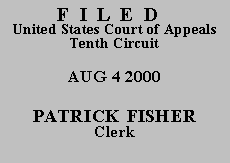

| DAVID PADILLA,
v.
DONALD DORSEY |
No. 00-2043
(D.C. No. CIV-98-1135-JC) |
Padilla was convicted in New Mexico state court on January 29, 1996 on three counts of armed robbery, one count of attempt to commit armed robbery, and two counts of conspiracy to commit armed robbery. On April 29, 1996, he was sentenced to 27 years imprisonment, of which nine years was suspended. Padilla then appealed his conviction, alleging insufficient evidence to support the conviction, abuse of the Court's discretion in using two separate juries while joining Padilla's trial with that of co-defendant Sanchez, other trial errors, and ineffective assistance of counsel. Padilla's conviction was affirmed by the New Mexico Court of Appeals on May 7, 1998. The New Mexico Supreme Court denied certiorari on June 25, 1998.
Padilla filed the instant § 2254 habeas petition on September 16, 1998 claiming (1) that he was prejudiced as a result of dual juries in a single trial and (2) that he was denied effective assistance of counsel in that his attorney failed to object when a venire member was named to the jury, even though this individual had been the subject of a peremptory challenge by defendant.
Because Padilla filed his federal habeas petition after April 24, 1996, his petition is governed by the provisions of the Anti-Terrorism and Effective Death Penalty Act ("AEDPA"). See Hooks v. Ward, 184 F.3d 1206, 1213 (10th Cir. 1999). The district court, adopting the report and recommendation of the magistrate judge, concluded that Padilla's petition should be dismissed because (1) the New Mexico Court of Appeals' opinion that there was no Bruton violation, see Bruton v. United States, 391 U.S. 123 (1968), as a result of the dual juries and no prejudice to Padilla was not an unreasonable application of federal law and (2) the loss of a peremptory challenge does not rise to the level of a constitutional violation.
Padilla now argues before this court only his claim that he was prejudiced as a result of dual juries in a single trial. After reviewing the relevant case law, the file and the arguments made by Padilla, both below and to this court, we conclude that he has not made a substantial showing of the denial of a constitutional right for substantially the same reasons Padilla's claims were rejected by the federal district court. Accordingly we DENY COA and the appeal is DISMISSED. Moreover, because we find that Padilla's appeal is frivolous and
fails to present a substantial question, we DENY his motion to proceed in forma pauperis.
ENTERED FOR THE COURT
David M. Ebel
Circuit Judge
*. After examining appellant's brief and the appellate record, this panel has determined unanimously that oral argument would not materially assist the determination of this appeal. See Fed. R. App. P. 34(a)(2) and 10th Cir. R. 34.1(G). The case is therefore ordered submitted without oral argument. This Order and Judgment is not binding precedent, except under the doctrines of law of the case, res judicata, and collateral estoppel. The court generally disfavors the citation of orders and judgments; nevertheless, an order and judgment may be cited under the terms and conditions of 10th Cir. R. 36.3.